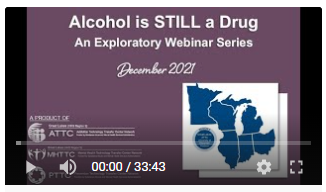
The Great Lakes A/MH/PTTC is offering this training for individuals working in HHS Region 5: IL, IN, MI, MN, OH, WI. This training is being provided in response to a need identified by Region 5 stakeholders.
Alcohol is STILL a drug. The opioid crisis, increase in stimulant misuse, and marijuana legalization dominate the news— yet alcohol remains the number one substance causing health, social, legal and financial problems throughout the US. While this series will focus on the hopefulness of recovery from alcohol use disorder, we’ll also take a deep dive into what we know about the full impact of alcohol overuse and the ways it affects every person in the US.
The December 7, 2021 session will focus on Alcohol Use Disorder Treatment. In this workshop, Joe Rosenfeld will briefly discuss the constant nature of alcohol as an epidemic and the early (pre-1950’s) efforts at treatment and recovery. Then present the emergence of the current Alcohol Use Disorder Treatment system and identify an array of evidence supported practices currently in use. In the process, Joe will “slay” a long-held treatment practice. But you’ll have to watch to learn which one.

Dr. Joseph Rosenfeld, Psy.D., CRADC., HS-BCP
Dr. Rosenfeld is a Licensed Clinical Psychologist, a Certified Reciprocal Alcoholism and Other Drug Counselor, and Human Services - Board Certified Professional. He is a Professor in the Addiction Counselor Training Program within the Human Services Department at Elgin Community College.
These are the overall learning objectives for the full 10-session series: